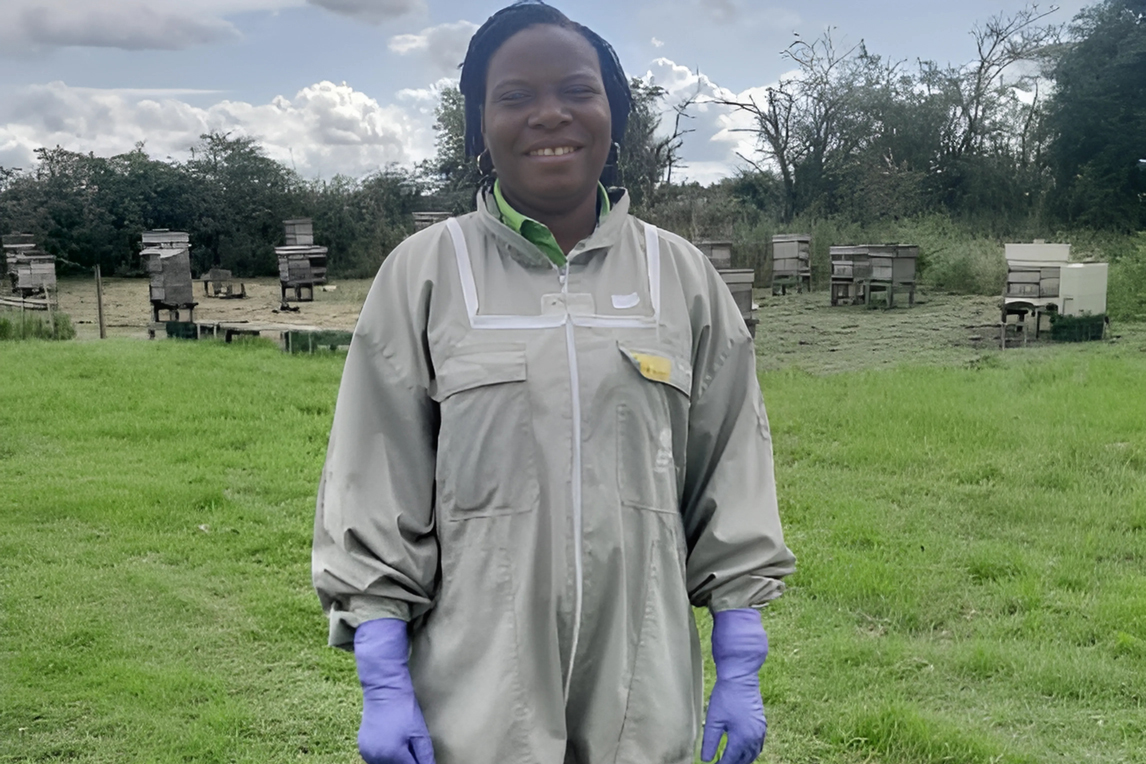
Adopting sustainable practices that cut down on the use of antimicrobials does more than just improve honey quality. It bolsters local economies, protects public health and enhances the resilience and biodiversity of ecosystems. ©FAO
Beekeepers are replacing antimicrobials with eco-friendly practices in apiaries across Ghana as they battle against Antimicrobial Resistance, hive by hive.
Take the example of Martha Adjorlolo’s beehives, set amid the rural landscape of Donkorkrom, in Ghana’s eastern region. They are her livelihood and her passion. Though she only started beekeeping a year ago, she has quickly become committed to sustainable beekeeping practices. She already uses local methods—like the top bar hive, a type of beehive that allows bees to build their comb on horizontal bars made from natural materials, as well as natural repellents such as lemongrass oil and wood ash— to manage pests.
But recently, her awareness of the importance of reducing chemicals and antimicrobial use has only grown sharper, especially after hands-on training by the Food and Agriculture Organization of the United Nations (FAO). The workshop, supported by the United States Agency for International Development (USAID), “was an eye-opener; it highlighted the urgent need for change in handling antimicrobials, not just for bee health, but for food safety and our environment,” says Martha.
Beekeepers sometimes use antibiotics in hives to manage bacterial infections or as a measure to support the health of their bee colonies. That’s why the workshop focused on raising awareness and preventing the problems posed by Antimicrobial Resistance (AMR). This occurs when microorganisms persist or grow despite using drugs known as antimicrobials designed to inhibit or kill them. These drugs treat infectious diseases caused by microorganisms such as bacteria, fungi, viruses and protozoan parasites.
When microorganisms become resistant to antimicrobials, standard treatments are often ineffective. In some cases, no drugs can provide effective therapy and treatments fail, leading to increased illness and mortality in humans, animals and plants.

The same goes for bees. “We learned at the FAO training that we use antibiotics without fully understanding the consequences,” Martha says. “Every choice we make ripples through our ecosystem,” she adds.
Another critical factor is that some beekeepers combine beekeeping with crop and animal farming, using antibiotics to control diseases in crops and livestock. While bees may not be the target, this approach has inadvertently introduced AMR to their bee colonies.
This matters because honey production in Ghana is not just a livelihood; it’s a pillar for rural communities and a source of economic stability. In 2019, the University for Development Studies, Tamale, Ghana conducted a study in the Northern Region of the country and discovered antibiotic residues in both imported and locally produced honey, underlining the contamination risks that could diminish consumer trust and potentially impact honey sales negatively.
By improving hygiene and management practices, Martha is determined to protect her bees and produce honey that’s safer for everyone. She has also integrated AMR education into local training sessions she runs for a beekeeping non-profit, helping other beekeepers understand the risks of indiscriminate antibiotic use. Her commitment is echoed by the other 62 workshop participants, who dove into practical lessons on bee disease management, AMR risks and sustainable practices.
For local beekeepers like Martha, FAO said it is helping to spread the message that adopting these practices does more than just improve honey quality; it bolsters their local economy, protects public health and enhances the resilience and biodiversity of their ecosystems.
Source: FAO News and Media Office, Rome
– global bihari bureau





